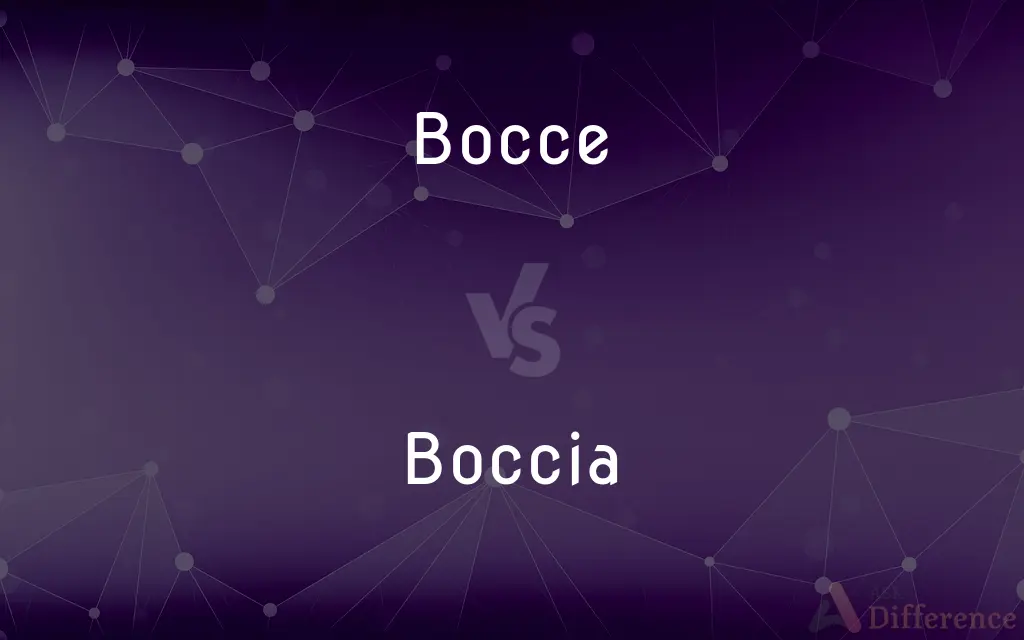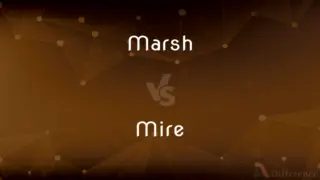Bocce vs. Boccia — What's the Difference?
Edited by Tayyaba Rehman — By Fiza Rafique — Updated on April 16, 2024
Bocce is a precision ball sport played on a long rectangular court, often on natural soil and asphalt, while Boccia is a similar sport but designed for athletes with physical disabilities, played on a flat, smooth surface indoors.

Difference Between Bocce and Boccia
Table of Contents
ADVERTISEMENT
Key Differences
Bocce is traditionally played on a rectangular court measuring about 27.5 meters in length and 2.5 to 4 meters in width, where players toss or roll heavy balls aiming close to a smaller target ball. On the other hand, Boccia is played on a smaller court, typically 12.5 meters by 6 meters, and is designed to accommodate wheelchair athletes.
In Bocce, the balls are typically made of metal or hard plastic, and the game can be played individually or in teams, which requires skill in both tossing and strategic placement. Whereas Boccia balls are made of leather and filled with plastic granules, making them softer and lighter to suit players with varying degrees of physical ability.
Bocce has its origins in ancient games from the Roman Empire, reflecting a long tradition that has evolved into a popular sport in Europe and America, played socially and competitively. Boccia, on the other hand, was specifically developed for athletes with disabilities, introduced at the Paralympics in 1984, emphasizing inclusivity and accessibility.
The objective in Bocce is to throw bocce balls so they land closer to the target ball, or pallino, than those of the opponent, which demands precision and strategy. In contrast, Boccia also aims at positioning balls near a target ball, but players can use ramps and assistants if needed due to physical disabilities.
Bocce games often involve a considerable amount of walking and physical movement around the court, making it a physically engaging activity. Meanwhile, Boccia is designed to minimize the need for physical exertion, focusing more on tactic and accuracy from a stationary position.
ADVERTISEMENT
Comparison Chart
Origin
Ancient Roman and Italian roots.
Invented for athletes with physical disabilities, 1980s.
Court Size
27.5m x 2.5-4m, outdoors.
12.5m x 6m, indoors.
Ball Material
Metal or hard plastic.
Leather with plastic granules.
Accessibility
Requires physical movement and strength.
Accessible to people with severe physical disabilities.
Playing Style
Involves walking and active participation around the court.
Played from a stationary position, often using ramps.
Compare with Definitions
Bocce
Popular in European and American communities.
The annual bocce league attracts teams from all over the city.
Boccia
Balls are soft, made of leather and plastic granules.
Boccia balls are specially designed to be easy to grip and release.
Bocce
Played primarily outdoors on soil or asphalt surfaces.
The bocce tournament was set up in the community’s newly built court.
Boccia
A Paralympic sport designed for athletes with physical disabilities.
He won a gold medal in boccia at the last Paralympic Games.
Bocce
Can be played individually or in teams.
She prefers team bocce because it's more strategic.
Boccia
Played indoors on a smooth, flat court.
The school adapted its gym to accommodate boccia competitions.
Bocce
A ball sport involving throwing a heavier ball towards a smaller target ball.
They played bocce at the park during the summer reunion.
Boccia
Focuses on precision and tactic over physical exertion.
Boccia requires a sharp mind to anticipate the opponent’s moves.
Bocce
Requires physical skill and strategy.
Mastering bocce requires understanding both the terrain and your opponent.
Boccia
Players may use assistants or adaptive devices to play.
Her boccia skills improved dramatically after getting a custom ramp.
Bocce
Bocce (, or , Italian: [ˈbɔttʃe]), sometimes anglicized as bocce ball, bocci or boccie, is a ball sport belonging to the boules family, closely related to British bowls and French pétanque, with a common ancestry from ancient games played in the Roman Empire. Developed into its present form in Italy, bocce is played around Europe and also in other areas with Italian immigrants, including Australia, North America, and South America, principally Argentina and Rio Grande do Sul.
Boccia
Boccia ( BOTCH-ə) is a precision ball sport, similar to bocce, and related to bowls and pétanque. The name "boccia" is derived from the Latin word for "boss" – bottia.
Bocce
An Italian game similar to bowls but played on a shorter, narrower green.
Boccia
A sport, similar to bocce, designed to be played by people with impaired motor skills.
Bocce
A game of Italian origin similar to lawn bowling that is played with wooden balls on a long narrow court covered with fine gravel.
Bocce
A game, similar to bowls or pétanque, played on a long, narrow, dirt-covered court
Bocce
One of the eight balls that the player throws in a game of bocce.
Bocce
Italian lawn bowling (played on a long narrow dirt court)
Common Curiosities
What equipment is needed to play Bocce?
Bocce requires a set of bocce balls and a smaller ball called a pallino or jack, which serves as the target.
Can Boccia be played by able-bodied individuals?
Yes, while Boccia is designed for athletes with disabilities, it can be played by anyone focusing on skill and strategy.
What surfaces are suitable for playing Bocce?
Bocce can be played on a variety of surfaces including sand, grass, dirt, or synthetic courts designed specifically for the sport.
What is the typical weight of a Bocce ball?
Bocce balls typically weigh about 920 grams each.
Is there a professional league for Bocce?
Yes, several countries have professional Bocce leagues that hold tournaments and championships.
What are the scoring rules in Bocce?
In Bocce, points are scored by getting your balls closer to the pallino than your opponent's closest ball.
Are there different types of balls used in Boccia?
Yes, Boccia balls vary in hardness and size, accommodating different strategies and player preferences.
How is Boccia scored?
Scoring in Boccia is similar to Bocce; points are awarded for balls that are closer to the jack than the opponent’s closest ball after all balls have been played.
Can Boccia be played outdoors?
Although typically played indoors to control surface consistency and environment, Boccia can technically be played outdoors if the surface is smooth and flat.
Are there international competitions for Boccia?
Yes, Boccia is included in the Paralympic Games and has its own world championships organized by the Boccia International Sports Federation (BISFed).
How do beginners get started with Bocce?
Beginners can start by learning the basic rules and practicing simple throws on any available lawn or sand court.
What are the dimensions of a Bocce ball?
A standard Bocce ball has a diameter of about 107 millimeters.
What is the historical significance of Bocce?
Bocce has ancient origins and has been played in various forms since Roman times, reflecting a deep cultural heritage in Europe.
What organizations govern Boccia internationally?
The Boccia International Sports Federation (BISFed) governs Boccia globally, setting rules and organizing international competitions.
How does team play work in Boccia?
Teams in Boccia consist of individuals, pairs, or teams of three, where strategy and communication are key to placing the balls effectively.
Share Your Discovery

Previous Comparison
Craw vs. Raw
Next Comparison
Marsh vs. MireAuthor Spotlight
Written by
Fiza RafiqueFiza Rafique is a skilled content writer at AskDifference.com, where she meticulously refines and enhances written pieces. Drawing from her vast editorial expertise, Fiza ensures clarity, accuracy, and precision in every article. Passionate about language, she continually seeks to elevate the quality of content for readers worldwide.
Edited by
Tayyaba RehmanTayyaba Rehman is a distinguished writer, currently serving as a primary contributor to askdifference.com. As a researcher in semantics and etymology, Tayyaba's passion for the complexity of languages and their distinctions has found a perfect home on the platform. Tayyaba delves into the intricacies of language, distinguishing between commonly confused words and phrases, thereby providing clarity for readers worldwide.














































